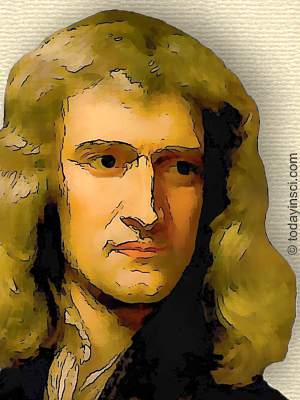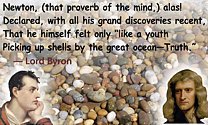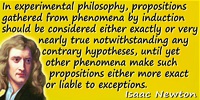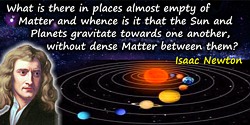 (source)
(source)
|
Sir Isaac Newton
(25 Dec 1642 - 20 Mar 1727)
English physicist and mathematician who made seminal discoveries in several areas of science, and was the leading scientist of his era.
|
Isaac Newton - Playing on the Seashore
Did Newton Really Say It?
More Isaac Newton quotes >>
You may have seen this quote, attributed to Isaac Newton, but how sure is it that he actually said it? It does not appear in his writings. In fact, it seems it did not appear in print until a collection by Rev. Joseph Spence (1699-1768), Anecdotes, Observations and Characters, of Books and Men.1 There, it is purported to have been uttered by Newton “a little before he died” (1727), and was contributed by Andrew Michael Ramsey (1686-1743, known in France as Chevalier de Ramsay). However, note that the entry for Ramsay in the Dictionary of National Biography records he was in France at the time, only returning to England in 1730, which is after Newton's death. Thus it remains unclear how Ramsay came to know of the anecdote.
Whatever the truth may be concerning a private conversation, it is, of course, lost in time. However, it remains an engaging description of Newton, as he regarded himself as only on the shore of a great ocean of truth. That insight certainly remains valid, for he could never have envisioned the atomic structure of matter, quantum theory and discoveries of the universe made by giant telescopes, space probes, and so much more.
When quoted in physicist David Brewster's biography of 1855, Memoirs of the Life, Writings, and Discoveries of Sir Isaac Newton,2 there was no discussion of the origin of the words. Brewster was born in 1781, more than a half-century after Newton died, so he could have no first-hand knowledge, and could barely have known many people still living that met Newton, so even second-hand information would have been difficult to come by. However Brewster did provide a commentary: “What a lesson to the vanity and presumption of philosophers; to those, especially, who have never even found the smoother pebble or the prettier shell! What a preparation for the latest enquiries, and the last views, of the decaying spirit,—for those inspired doctrines which alone can throw a light over the dark ocean of undiscovered truth!”
Spence similarly footnoted the entry in his book, “This interesting anecdote of our great philosopher's modest opinion of himself and his discoveries, is only another proof of his consummate wisdom. It will recall to the memory of the poetical reader the following beautiful passage from the Paradise Regained of our great poet.” There followed an excerpt from John Milton's work, published in 1671, in which line 330 refers to children gathering pebbles:4
Incessantly, and to his reading brings not
A spirit and judgment equal or superior,
(And what he brings, what need he elsewhere seek)
Uncertain and unsettled still remains;
Deep vers'd in books, and shallow in himself,
Crude or intoxicate, collecting toys,
And trifles for choice matters, worth a sponge,
As children gathering pebbles on the shore.
Byron also makes direct reference to the metaphor in his “Don Juan”, when he wrote:5
Declared, with all his grand discoveries recent,
That he himself felt only “like a youth
Picking up shells by the great ocean—Truth.”
There is a self-deprecating paraphrase by the astronomer John Herschel, who followed in Newton’s footsteps as Master of the Mint. He alluded to the Newton anecdote, when he explained, in 1826, why he did not seek Newton’s Lucasian Chair at Cambridge. Herschel wrote it was because he felt himself better suited “to loiter on the shores of the ocean of science and pick up such shells and pebbles as take my fancy for the pleasure of arranging them and seeing them look pretty.”3
There is an oft-told story of Newton being inspired by watching an apple fall. Another tells of Diamond, a dog that knocked over a candle on Newton's desk, and burned up a substantial manuscript. Those myths live on. Perhaps the “playing with pebbles” sentiment was also manufactured, no doubt in reverence to the passing of the genius. But, who knows?
2 David Brewster, Memoirs of the Life, Writings, and Discoveries of Sir Isaac Newton (1855), Vol. 2, 407-408.
3 Letter to William Whewell (17 Aug 1826), Add MS a 207¹², as cited in Silvan.S. Schweber, 'John Herschel and Charles Darwin: A Study in Parallel Lives', Journal of the History of Biology (1989), 22, 69.
4 The text above is as found in Spence. In John Milton and Henry J. Todd (ed.), Paradise Regained (2nd ed.,1809), Vol. 5, 262, there is an explanation of the phrase “worth a sponge.” An editorial footnote attributed to Dunster says the phrase “most probably alluded to the sponge as used by the ancients for the purpose of blotting out anything they had written, and did not choose to preserve.” Thus “worth a sponge literally means not worth seeing the light, not worth preserving.”
5 From poem, 'Don Juan,' (1822), canto 7, verse V. In Lord Byron, Don Juan: Cantos VI, VII and VIII (1823), 67.
- Science Quotes by Sir Isaac Newton.
- 25 Dec - short biography, births, deaths and events on date of Newton's birth.
- Isaac Newton - biography from Famous Men of Science (1889)
- Isaac Newton - “Playing on the Seashore” illustrated quote - Medium 500px.
- Isaac Newton - “Playing on the Seashore” illustrated quote - Large 800px.
- Isaac Newton - context of quote “A change in motion” - Medium image (500 x 250 px)
- Isaac Newton - context of quote “A change in motion” - Large image (800 x 400 px)
- Isaac Newton - context of quote “In experimental philosophy” - Medium image (500 x 250 px)
- Isaac Newton - context of quote “In experimental philosophy” - Large image (800 x 400 px)
- Isaac Newton - context of quote “Standing on the shoulders of giants” - Medium image (500 x 250 px)
- Isaac Newton - context of quote “Standing on the shoulders of giants” - Large image (800 x 400 px)
- Isaac Newton - context of quote “Impressed force is the action” - Medium image (500 x 250 px)
- Isaac Newton - context of quote “Impressed force is the action” - Large image (800 x 400 px)
- Isaac Newton - context of quote “Inherent force of matter is the power of resisting…” - Medium image (500 x 250 px)
- Isaac Newton - context of quote “Inherent force of matter is the power of resisting…” - Large image (800 x 400 px)
- Isaac Newton - context of quote “Plato is my friend” - Medium image (500 x 250 px)
- Isaac Newton - context of quote “Plato is my friend” - Large image (800 x 400 px)
- Isaac Newton - context of quote “Colours which appear through the Prism ” - Medium image (500 x 250 px)
- Isaac Newton - context of quote “Colours which appear through the Prism ” - Large image (800 x 400 px)
- Isaac Newton - context of quote “Nature does nothing in vain” - Medium image (500 x 250 px)
- Isaac Newton - context of quote “Nature does nothing in vain” - Large image (800 x 400 px)
- Isaac Newton - context of quote “No more causes of natural things should be admitted” - Medium image (500 x 250 px)
- Isaac Newton - context of quote “No more causes of natural things should be admitted” - Large image (800 x 400 px)
- Isaac Newton - context of quote “Truth is ever to be found in simplicity” - Medium image (500 x 250 px)
- Isaac Newton - context of quote “Truth is ever to be found in simplicity” - Large image (800 x 400 px)
- Isaac Newton - context of quote “Every body perseveres in its state of being at rest” - Medium image (500 x 250 px)
- Isaac Newton - context of quote “Every body perseveres in its state of being at rest” - Large image (800 x 400 px)
- Isaac Newton - context of quote “God, in the beginning, formed matter” - Medium image (500 x 250 px)
- Isaac Newton - context of quote “God, in the beginning, formed matter” - Large image (800 x 400 px)
- Isaac Newton - context of quote “The cause of gravity is what I do not pretend to know” - Medium image (500 x 250 px)
- Isaac Newton - context of quote “The cause of gravity is what I do not pretend to know” - Large image (800 x 400 px)
- Sir Isaac Newton’s Apple-Tree - debunking the myth, from Historic Ninepins: A Book of Curiosities by John Timbs (1869)
- Newton and the Dog - debunking the myth about Newton’s dog Diamond.
- Booklist for Isaac Newton.
![Isaac Newton Quote: like a boy playing on the seashore [pebbles]…whilst the great ocean of truth lay all undiscovered before me](https://todayinsci.com/N/Newton_Isaac/NewtonIsaac-SeashoreQuote500px.jpg)










